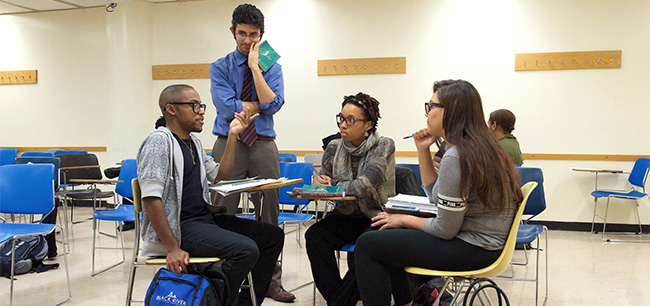
Professor Chez is exploring how the idea of what it means to be human is a production of discourses promulgated by literature and culture. Applying animal, gender, and postcolonial studies approaches, my research investigates the formation of subjectivities in nineteenth-century England and America as well as in the present time.
Professor Crocco’s current research interests include games-and-simulation-based learning, gamification, critical pedagogy, and representations of work and play in utopian studies. He is currently working on creating a game-based developmental math course for aspiring STEM majors.
Professor Delano’s area of resarch includes women’s self-presentation and their sense of agency and citizenship. She is working on a book length project about American women in Europe (Spain, France, and Germany) during the long World War II, 1937-1948, from the Spanish Civil War, to Occupied France, to post-war Germany. Delano has also introduced courses at BMCC on literature of the Vietnam War and on genocide.
Professor Derbyshire’s research looks at the writing of British eighteenth and early nineteenth century labouring-class poets, and John Clare specifically, to understand how these writers use images, figures of speech, and literary forms to represent the human relationship to the natural world as well as the literary marketplace. Using ecocriticism, narrative theory, and new-formalist approaches,she investigate genres such as poetry and natural history prose. She is especially interested in how authors adapt literary structures and forms to create effects in meaning, particularly the personification of the non-human and prosopopoeia (projecting voice onto inanimate or abstract things).
Professor Fish has published essays on environmental justice and literature, film, and architecture in journals and anthologies including MELUS and Discourse. Her manuscript of documentary poetry Crater &Tower, examines trauma and natural and man-made disaster, focused on Mount St. Helens Volcano and the terrorist attack on The World Trade Center.
Professor Klock’s work argues that Matt Fraction’s science-fiction version of James Bond radically redefines masculinity in popular culture, while also challenging the status quo of the entire comic book industry. 50,000 words. Because Casanova is a comic book series only half finished he also under contract to write a book about the second half, when it is completed.
Professor Noimann’s research extends and broadens our understanding of Victorians’ sentimentalization of childhood and seeks to place the long-standing debate over their fascination with the child in a less sexual and more political and cultural framework.
Professor Schneiderman’s poetry and essays have appeared in numerous journals and anthologies, including American Poetry Review, The Best American Poetry, Poetry London, Grand Street, The Penguin Book of the Sonnet, Story Quarterly, and Tin House. His research interests focus on prosody and questions of queer futurity.
Professor Zonana is currently completing a translation of Henri Bosco’s 1949 novel Malicroix. She has published extensively on Victorian literature, feminist theory, and postcolonial writers, and has two articles forthcoming on Egyptian Jewish fiction.

